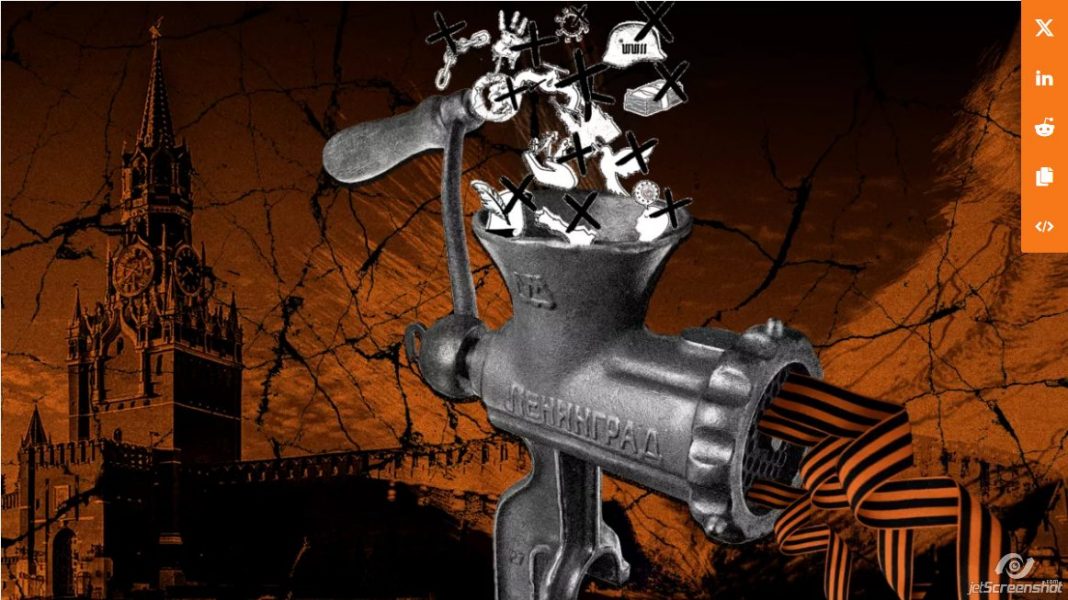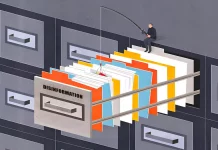By EUvsDisinfo
Thirteen is traditionally regarded as an unlucky number in the West. So perhaps it is appropriate that we have updated our previous list of the most prominent Russian myths by increasing the number from twelve to thirteen.
Why the difference? First, we have grouped together some of the previously identified pro-Kremlin disinformation narratives targeting Ukraine. Second, we separated out from the overall ‘Ukraine is evil/Nazi’ group two narratives alleging, respectively, that Ukraine is losing the war and that it does not exist. If that phrase makes no sense, then we welcome you to pro-Kremlin disinformation.
You’ll see many golden oldies below. For the Kremlin, repetition is a common modus operandi, so don’t be surprised if some of these disinformation narratives and myths seem familiar – we exposed many of them already last year.
However, this time we have grouped these 13 myths into the three broadest meta-narratives of Russian disinformation. The first group, describing myths one to four, characterises Ukraine, Ukrainians and Ukrainian-ness as evil and anti-Russian. The second group, consisting of myths five to nine, posit the West as Russia’s implacable if also strangely incompetent enemy.
The third group, comprising myths 9 to 13, portrays Russia as better than the West and Ukraine put together. According to the Kremlin, Russia is just better – stronger, more legitimate, and armed with better weapons. And Russian nationalists also assert that Russia is morally superior because Europe is perverted.
Myth 1: Ukraine has been trying to commit genocide against Russian-speakers in Donbas for years and Russia intervened only to protect its own people. Ukraine also conducts false flag operations and stages atrocities and then blames Russia for them.
To shield itself against charges of genocide, Kremlin propagandists often engage in projection of their own crimes onto their victims or even just slinging completely baseless accusations. That is, they accuse Ukraine without evidence of trying to commit genocide against Russian speakers in Ukraine, often using made-up stories. The genocide narrative has been an integral part of the pro-Kremlin disinformation campaign aiming to justify Russian aggression.
There is no evidence that any ethnic nationals, including ethnic Russians or Russian speakers, are facing persecution at the hands of the Ukrainian authorities in Donbas or elsewhere in Ukraine, much less the danger of annihilation on grounds of nationality, ethnicity, or cultural belonging.
Mountains of evidence, however, link Russian military forces directly to war crimes in Bucha, Irpin, Mariupol, and other places. The United Nations, for its part, has issued a report detailing evidence of war crimes committed by Russian authorities including torture, rape, and the deportation of children.
In fact, many independent fact-checkers and media outlets have dismissed Russian claims that Ukrainian authorities somehow staged Russian war crimes, particularly in Bucha.
Myth 2: Ukraine is losing, its leadership is desperate, and its military collapse is inevitable. In addition, Ukraine is so desperate that it is attacking civilian nuclear infrastructure and working on a ‘dirty bomb’.
In 2023 Ukraine’s counteroffensive made only marginal gains. However, since Russia’s 24 February 2022 invasion, Ukraine has taken back about half of the territory initially occupied by Russia in February 2022. The current battlefield situation may appear to be a stalemate, and yet Ukraine continues to score impressive victories in the Black Sea.
Overall, Ukraine’s success in holding off Russia’s massive, illegal, and unprovoked invasion remains nothing short of inspirational. The country is not close to collapsing either politically or militarily, even when sometimes international support to Ukraine is not as expedient as it could be.
There is no evidence to support Russian claims that Kyiv is mobilising children, women, or the elderly for frontline combat or that President Volodymyr Zelenskyy is purposely sending Ukrainian troops to a slaughter. If anything, evidence indicates the opposite: that Russian generals are sending their troops, many recruited from prisons, on suicidal ‘meat assaults’.
The myth a about Ukrainian nuclear ambitions or ‘dirty bombs’ is a work of pure fiction and nuclear scaremongering. In fact, Ukraine has been a nuclear-weapon-free country since 1994 when it signed the Budapest Memorandum. It is one of the few countries in the world to have relinquished a nuclear arsenal, having eliminated the weapons that it inherited from the Soviet Union. Russia, on the other hand, has blatantly disregarded the commitment it made when it signed the treaty confirming that it would respect the independence, sovereignty, and borders of Ukraine.
The Kremlin is also quick to deploy nuclear narratives to deflect blame, to issue thinly veiled threats, or to resort to nuclear blackmail to support its aggression. Creating an image of a cornered yet nuclear-armed animal (as pro-Kremlin demagogues always emphasise) works to the Kremlin’s advantage.
Russia has used its accusations that Ukraine is attempting to create a ‘dirty bomb‘ as a pretext for greater escalation. Ukraine invited the IAEA to investigate the sites Russia has said are used for dirty bomb development. The IAEA has found no evidence that Ukraine is developing nuclear materials.
The claims that Ukraine is purposefully damaging its own civilian nuclear infrastructure are equally unfounded. In fact, Ukraine and the US have repeatedly tried to defuse tension around the Zaporizhzhia nuclear power plant. Russia has taken many reckless actions targeting this facility. It has placed military equipment and troops inside the premises, used its surroundings as a base for rocket and missile attacks, taking the de-facto control over the facility, and cut the link to its main power line multiple times. The IAEA has not confirmed any Ukrainian bombing or attacks on the power plant either before or after Kremlin accusations to that effect.
Myth 3: Ukraine does not exist as a state. Its peoples have chosen to return to Russia in referendums.
Denying Ukraine’s statehood and sovereignty is another go-to disinformation narrative that pro-Kremlin pundits have peddled for years. President Putin himself has often perverted the historical record to claim that Ukrainian did not exist until the Bolsheviks created it. But Ukraine is a sovereign state with its own identity and a long history.
In fact, as we noted above, Russia recognised and pledged to respect Ukrainian territory and sovereignty in 1994 when it signed the Budapest Memorandum. The Kremlin leadership since has glibly violated the Memorandum, while telling cynical lies about the Memorandum’s content and alleged Ukrainian violations of it. Russia has also used bogus referendums in occupied territories to justify jettisoning the Memorandum while making illegal land-grabs.
In sum, the Kremlin has done everything it can to undermine Ukrainian statehood. Given the circumstances, Ukrainians’ determination to hold onto their state and identity is all the more impressive.
Myth 4: ‘Ukrainians’ do not truly exist because they are really Russians. Their Nazi leaders and Western usurpers have brainwashed them into thinking that they are Ukrainians.
The Ukrainians in the trenches defending their country from Russian attacks do not seem confused about who they are. They do know who is attacking them, who is helping them to defend themselves and what they are defending.
Nonetheless, Kremlin propagandists, including Putin himself, often roll out the bizarre claim that Ukrainians and Russians are one people that should be united, albeit under Putin’s tender, loving gaze. In this alternative reality, so-called Ukrainians are suffering from a false consciousness instilled by the West that has separated them form their true Russian selves. In fact, this upside-down logic goes, Russia is actually saving Ukraine by incorporating it back into the Russian World.
It is always a hard sell to convince someone that you know their interests better than they do. It is even harder to convince them that by bombing them, you are trying to save them. Of course, Ukrainians and Russians do share much history and culture. The great irony is that by launching his illegal invasion, Putin forced Ukrainians into a war for their independence that will inevitably sharpen their uniquely Ukrainian identity, rather than weaken it.
Myth 5: The West, in particular the US, started the war in Ukraine. Moscow had no choice but to defend itself. It is now fighting the assembled might of the ‘collective West’ that hopes to use the war in order to weaken or destroy Russia. Western military assistance only prolongs Ukraine’s suffering.
The current, full-scale war began when Russia invaded Ukraine on 24 February 2022. The false claim that the West, acting through Ukraine, is the aggressor is a classic disinformation tactic to portray Russia as the victim of its own war of choice. While this narrative is transparently absurd, for the increasingly insular information environment in Russia it serves as a rallying cry to mobilise public support for the Kremlin’s authoritarian policies.
Neither is Russia fighting the ‘collective West’. Pro-Kremlin pundits deploy this narrative whenever Ukraine receives military support from its Western partners, or when Russia is losing its hold on temporarily occupied territories in Ukraine. The EU, the US, and many NATO member states have provided Ukraine with military assistance to help Ukraine repel Russia’s unprovoked aggression, but they are not involved in any fighting. The West doesn’t want to destroy Russia. It wants Russia to stop trying to destroy Ukraine.
Myth 6: The US funds secret biological weapons development programmes that operate in laboratories in Ukraine and elsewhere.
Fabricated stories of ‘clandestine US biolabs’ are a classic case of a conspiracy theory meeting a scaremongering tactic, often deployed by the Kremlin to distract and confuse. Initially used to hinder the US-Ukrainian partnership to reduce biological threats, the pro-Kremlin disinformation ecosystem repurposed an old disinformation campaign to justify Russia’s unprovoked invasion of Ukraine.
Pro-Kremlin disinformation seeks to blur the line between biological weapons and biological research, instilling fear while discrediting Ukraine. Authoritative sources, including UN High Representative for Disarmament Affairs Izumi Nakamitsu, have repeatedly debunked allegations that US-funded biological laboratories in Ukraine are used for military purposes.
Myth 7: Western sanctions against Russia are illegal, destabilise the global economy, and drive up the cost of living for ordinary citizens around the globe. Sanctions strengthen Russia while boomeranging back against European economies. EU citizens are protesting against sanctions and leaders who authorised them.
Pro-Kremlin disinformation about the EU and Western sanctions is a bundle of contradictions. Somehow sanctions are an illegal, destabilising form of coercion, but they also do not work and even strengthen Russia. This disinformation narrative downplays the impact of sanctions for domestic audiences in Russia, and creates the false impression that the EU is collapsing. Internationally, the Kremlin wants to stoke unsubstantiated fears that Western actions against Russia have negative global consequences.
All EU sanctions are fully compliant with obligations under international law. Sanctions are reducing Russia’s means to finance the war and acquire key components for its military-industrial complex.
In early 2024, the Russian Federal State Statistics Service, Rosstat, reported that the Russian economy grew over 3 per cent in 2023. But many economists believe that Russia’s economic data lacks transparency and reliability, with some suggesting that statistics are distorted.
Even if one takes Russia’s figures at face value, the country’s seemingly positive macroeconomic figures are largely a result of its shift to a war-type economy. This transition is primarily focused on the focus on industrial production of military equipment for the invasion of Ukraine, much of which is later destroyed or consumed on the battlefield, leading to the neglect of other economic sectors. Foreign Direct Investment has dropped to insignificance.
According to the data analysed by Bank of Finland Institute for Emerging Economies, the reliance of Russia’s recovery on war-related branches makes it increasingly difficult for Russia to maintain its current GDP growth rate. Constant increases in public spending are unsustainable and the military industry is already reported to encounter capacity constraints. The current focus on military production has diverted resources from Russia’s civilian industries, making it more difficult to rely on branches that typically form the backbone of advanced economies to provide long-term growth. Moreover, Russian military spending is very high. For example, one massive missile attack on Ukraine on 2 January 2024 cost Russia about $620 million.
Concurrently, the ruble has undergone significant depreciation. Inflation is soaring, and there are signs of economic overheating. Consequently, an increasing number of Russian citizens have felt the financial strain of the war in their everyday lives.
Myth 8: Europe is weak and divided. The EU and its leaders are US puppets. EU sanctions caused a global food shortage by banning Russian agricultural products and an energy crisis by banning Russian oil and gas imports.
Pro-Kremlin outlets regularly portray European states as puppet states or vassals of the US and NATO in order to diminish them. See our analysis of the Kremlin’s claims about the EU’s lost sovereignty. In February 2024, however, the supposedly weak and divided EU mustered the political will to approve a €50 billion Ukraine Facility to provide financing for Ukraine’s recovery.
The EU is not the enemy of Russia. But bilateral relation are heavily affected by Russia’s unprovoked and unjustified full-scale invasion of Ukraine. The European Council has adopted 12 packages of sanctions against Russia and Belarus. These restrictions are aimed at weakening Russia’s ability to finance the war and specifically target the political, military, and economic elite responsible for the invasion. By imposing sanctions on Russia, the EU aims to send a strong signal of resolve and unity to the Kremlin and degrade Russia’s ability to wage war.
Regarding the international impact of sanctions, EU sanctions have important exemptions. They explicitly exclude food supplies and fertilisers. A primary source of rising energy prices was not sanctions, but Russia’s 2022 invasion of Ukraine.
Myth 9: European states desperately need Russian oil and gas and will eventually collapse without them.
The Kremlin has a long tradition of weaponising energy in its foreign relations, and deploying disinformation is an integral part of this tactic. Only this time, Russia’s gambit to intimidate the EU by stopping gas flows blew up spectacularly in the Kremlin’s face when Europe failed to freeze in winter. When Russia demanded that Europe choose between Ukraine and Russian energy, the European answer was unequivocal – Ukraine.
The EU and its Member States were quick to undertake multiple counter-measures in order to increase energy security, such as the REPowerEU plan and the ‘Save gas for a safe winter’ plan, which consists of voluntary reduction of natural gas demand by 15%. EU underground gas reserves were filled, and as of February 2024, they were over 80% full. Europe also diversified its gas imports, and avoided Russia’s energy blackmail.
Pro-Kremlin disinformation also tries to drive wedges in transatlantic unity by painting a false picture of lost EU sovereignty. Specifically, outlets alleged that the US has subjugated the EU and benefits from turmoil in global energy markets. However, the diversification of energy supplies is a cornerstone of the EU’s energy policy. It helps to strengthen European energy security by preventing monopolisation and introducing more competition to the energy market.
Myth 10: Russia’s victory against Ukraine is inevitable. Ukraine and the West should accept this and stop refusing peace negotiations. The world supports Russia more than it supports the West or Ukraine.
Since Russia launched its ‘three day war’, Ukraine has successfully stemmed the invaders’ advance, turned the tide, and liberated considerable territory from Russian temporary military control. Ukrainian forces have also seriously eroded Russian military assets.
Ukraine’s perseverance in the face of overpowering aggression has shown us the true meaning of grit. Western military support to Ukraine is making a difference on the battlefield every day, helping Ukraine to uphold its right of self-defence, which is enshrined in the United Nations Charter.
Russian proposals for ceasefires or peace negotiations are not sincere, but merely PR stunts. When closely analysed, they reveal imperialistic Russian demands for Ukraine to surrender and give up more of its territory and sovereignty.
The true path to peace is the complete withdrawal of Russian forces beyond Ukraine’s internationally recognized borders, and the complete abandonment of its aggressive policy. Russia started an unprovoked war in Europe in blatant disregard of international law, notably the UN Charter. Peace cannot be achieved by letting an unarmed Ukraine face a highly militarised Russia that denies its sovereignty and does not hide popular calls for genocide.
Regarding global support, we note that some 40 countries, including most Western nations, continue to provide military, humanitarian, and financial support to Ukraine, including China. Several international human rights groups, including Human Rights Watch, recently released a report calling for Putin and other senior Russian officials to be investigated for war crimes in relation to Russia’s assault on the Ukrainian city of Mariupol. And the UN General Assembly has demanded with an overwhelming majority that Russia withdraw all its military forces from the territory of Ukraine.
Russia, by contrast, has the following firm allies: Belarus, the Democratic Republic of North Korea, Eritrea, and Syria.
Myth 11: Russia is fighting a holy war against godless Ukraine to protect traditional values. Russia is the true protector of Christianity and indeed all faith. Ukraine, usurped by the godless heathens of the Kyiv regime is fundamentally evil.
Russia has frequently referenced fighting a holy fight against Satan himself to justify its war against Ukraine. In the early weeks and months of the war, the Kremlin used allegations of Ukraine’s unholy alliance with the forces of Hades to explain the lack of Russian progress on the battlefield.
Often, pro-Kremlin disinformation pundits, particularly Vladimir Solovyov, deploy this disinformation narrative in conjunction with unfounded accusations against Ukraine and the West for allegedly attempting to destroy the Orthodox Church. This manipulative tactic picked up steam in 2019 when the Orthodox Church of Ukraine was granted the status of an independent church and again in November 2022 when the Ukrainian government announced it would draw up a law banning churches affiliated with Russia.
Demonising Ukraine and its Western supporters as godless heathens goes hand in hand with pro-Kremlin disinformation that the West wants to destroy ‘traditional values’, while Russia protects them. This disinformation narrative of protecting threatened values is steeped in disinformation about the LGBTIQ+ community that often even crosses the line of outright hate speech.
Myth 12: In Ukraine, Russia is fighting against Western imperialism and neo-colonialism and for a multipolar world order where countries do not interfere in each other’s internal affairs.
The Kremlin regime has long sought to publicly style itself as anti-imperialist and anti-colonialist. However, Russia’s brutal war of aggression against Ukraine exposed Russia’s own imperial and colonial ambitions vis-à-vis its neighbours in Europe, Caucasus and Asia.
By launching a war in Eastern Ukraine in 2014, illegally annexing Crimea the same year, and starting a full-scale invasion in 2022, Russia has grossly violated international law and the UN Charter, threatening world peace, global security, and stability.
On 2 March 2022, the United Nations General Assembly, by an overwhelming majority, adopted a resolution rejecting the Russian Federation’s brutal invasion of Ukraine and demanding that Russia immediately withdraw its forces and abide by international law.
In October 2022, the UN General Assembly voted overwhelmingly to condemn Russia’s attempts to annex four temporarily occupied regions of Ukraine, following sham referendums.
The global condemnation of Russia’s military aggression against a peaceful neighbour shows that Russia is alone and isolated.
Myth 13: Ukraine is an evil Nazi state run by Nazi leaders. As such, its very existence threatens Russia. Russia is fighting to preserve history. All of Europe supported Nazi Germany’s invasion of the Soviet Union, just as Europe is now supporting Nazi Ukraine. Russia is continuing the Great Patriotic War in Ukraine to rid the world of Nazis.
Perhaps the foundational myth of Russian aggression against Ukraine is the accusation that Ukraine, Ukrainians, and Ukrainian-ness are all somehow Nazi. The accusation has always been absurd, and would be laughable if the Kremlin’s intent to act on the accusation were not murderous. Without this smear, Russian leaders could not justify their aggression against Ukraine. So they repeat it again, and again, again.
But this myth does more than justify Russia’s illegal invasion. It also serves as the basis for Russia’s would-be genocide against the Ukrainian language, culture, state and even the Ukrainian people, as we have noted before. In the imagination of radical Russian nationalists, Ukraine is an ‘anti-Russia’ countering Russia, as anti-matter counters matter, and its mere existence is a mortal threat. The Kremlin ends up labelling as Nazi anyone who resists its aggression towards Ukraine – including, for example, Canada.
We have closely followed the Kremlin’s use of the ‘Nazi spectre’ narrative for years. The Kremlin has consistently used this convenient disinformation trope throughout the war to dehumanise and vilify Ukrainians. Putin’s portrayal of Russia as the modern tamer of Nazism is a classic example of projection – a way for the Kremlin to shift blame from its own destructive actions.
The accusations that the whole of Europe supported Nazi Germany’s invasion of the Soviet Union are beyond bizarre. They turn history upside down. In fact, by 1942, the anti-Hitler coalition included 26 states, as well as the governments in exile of the occupied European countries. Russia’s invocation of fighting Nazism to trigger a strong psychological or emotional response is not only manipulative, it is outright ludicrous, particularly considering the Kremlin’s pivot to openly anti-Semitic rhetoric.
By EUvsDisinfo





